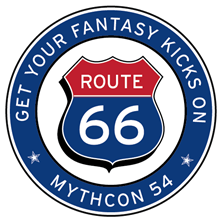Loading...
Event Website
https://www.mythsoc.org/oms/oms-2024.htm
Start Date
2-17-2024 7:30 PM
End Date
2-17-2024 8:20 PM
Description
In 1973, James Tiptree, Jr. (Alice Sheldon) published a sci-fi novella The Girl Who Was Plugged In and won the Hugo Award for Best Novella in 1974. Its male narrator is a time-traveller from a near-future America, where he works for a capitalist company GTX—Global Transmissions Corporation. The heroine "P. Burke [...] willingly allows her grotesque body to be confined in a hi-tech cabinet while her mind remotely operates the beautiful but soulless cloned body of Delphi" (Hollinger 133).
In my research, I apply a framework of trans-feminism in reading The Girl Who Was Plugged In to challenge the binary depiction of P. Burke and Delphi. By highlighting P. Burke's individuality, I question the usual feminist practice of elevating P. Burke's tragedy as cis-women's tragedy. The traditional (cis-)feminist reading of the narrative fails to acknowledge the peculiarity of the heroine's psyche-condition (as well as her disability), and the narrator's unique narrative position. In my opinion, the best way to appreciate the emotional truth of the narrative is to read P. Burke as a female trans-woman. The clichéd cis-feminist and post-humanist readings can overlook a (trans-)woman's individuality and fail to legitimise her desire to live as a feminine woman. I argue that the heroine could be seen as a female trans-woman, whilst a male persona for Alice Sheldon, like a drag persona, could have the dimension of self-creativity, parody of gender convention, and queer aesthetics.
Creative Commons License

This work is licensed under a Creative Commons Attribution-NonCommercial-No Derivative Works 4.0 International License.
Included in
Children's and Young Adult Literature Commons, Comparative Literature Commons, Digital Humanities Commons, European Languages and Societies Commons, Literature in English, Anglophone outside British Isles and North America Commons, Literature in English, British Isles Commons, Literature in English, North America, Ethnic and Cultural Minority Commons, Medieval Studies Commons, Modern Languages Commons, Modern Literature Commons, Other English Language and Literature Commons
Speak through the Drag—the Hidden (Trans-)/Woman in James Tiptree, Jr.’s ‘The Girl Who Was Plugged In’
In 1973, James Tiptree, Jr. (Alice Sheldon) published a sci-fi novella The Girl Who Was Plugged In and won the Hugo Award for Best Novella in 1974. Its male narrator is a time-traveller from a near-future America, where he works for a capitalist company GTX—Global Transmissions Corporation. The heroine "P. Burke [...] willingly allows her grotesque body to be confined in a hi-tech cabinet while her mind remotely operates the beautiful but soulless cloned body of Delphi" (Hollinger 133).
In my research, I apply a framework of trans-feminism in reading The Girl Who Was Plugged In to challenge the binary depiction of P. Burke and Delphi. By highlighting P. Burke's individuality, I question the usual feminist practice of elevating P. Burke's tragedy as cis-women's tragedy. The traditional (cis-)feminist reading of the narrative fails to acknowledge the peculiarity of the heroine's psyche-condition (as well as her disability), and the narrator's unique narrative position. In my opinion, the best way to appreciate the emotional truth of the narrative is to read P. Burke as a female trans-woman. The clichéd cis-feminist and post-humanist readings can overlook a (trans-)woman's individuality and fail to legitimise her desire to live as a feminine woman. I argue that the heroine could be seen as a female trans-woman, whilst a male persona for Alice Sheldon, like a drag persona, could have the dimension of self-creativity, parody of gender convention, and queer aesthetics.


